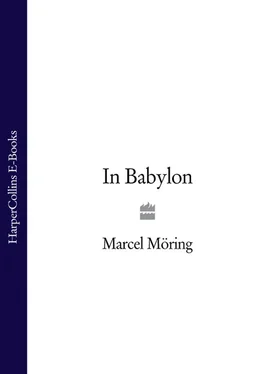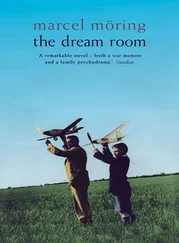The group of onlookers dispersed and Magnus slung the chest onto his back. He walked between two stalls and made his way to the large church in the middle of the market square. There, in the shelter of the buttresses, where it stank of rotting vegetables and old fish, he had a serious word with himself. How could he have been so stupid? To let himself be carried away by a pair of beautiful eyes? Imagine selling Reisele for a price that wouldn’t even cover the cost of … You’re in a strange land, Magnus Levi. You’ve got to keep silent and listen, instead of bragging and swooning. When he had gone past the church the sun came out again, and in the clear spring light he walked out of the market square, into an alleyway between two large white houses with stained glass windows. Behind the glass he saw a row of plants in white and blue pots. They bore red flowers, as big as apples. He had seen many things on his journey to the West: he had been in prosperous regions, but nowhere had he seen such abundance as in this place, nowhere had it been as clean, nowhere did the brass door knobs gleam as brightly as they did here. Behind the white houses was a cobblestoned street lined with clipped trees and tidy flower beds. As he walked among those little trees he heard the click-clacking of a woman’s heels. When he looked around he saw a servant girl, who had gathered up her skirts and was running towards him.
When she had caught up with him, she stood there for a while, panting. He waited for her to catch her breath, trying to look friendly. This wasn’t easy, because he was frightened. He had recognized her as the servant girl he had seen with the young woman who had been standing next to him at the market, and he was afraid she had come to tell him that he had behaved in an unseemly manner and that she would have him run out of town. That had happened to him before, somewhere in a Prussian village. He had never quite been able to discover what he had done wrong, but whatever it was, he had nearly been thrown in prison for doing it.
‘My mistress asks if you would be so kind as to repair the clocks in her father’s house,’ panted the girl.
He looked at her without quite understanding what she meant. She was young, maybe eighteen or nineteen, and she didn’t seem to find him at all threatening or strange. But that still didn’t set his mind at rest. ‘ Ich geh weiter ,’ he said. ‘ Andere Stadt. Muβ gehen …’
The servant girl sighed and shook her head. ‘They’ll pay you well,’ she said. ‘She wants you to come, sir. She’s seen your clock.’
Pride is like the sun that peeks out from between two clouds. Magnus felt the agreeable warmth of recognition.
‘ Die Dame ist nicht böse? ’ he asked.
The servant girl shook her head. ‘You may come this evening, seven o’clock,’ she said. She told him the address and made him repeat it three times. Anyone, she said, could show him the way. Her master’s house was known to all.
For the rest of that day Magnus wandered about the town. He looked at shops, peered through the open doors of coffee houses, and stood for a long time gazing at mothers as they walked with their young children across a grassy field. Ducks waddled along the banks of a pond, deer stood poised on a hilltop, a jay skimmed carelessly over his head. Everything was small and clear and still. Magnus had arrived in a fairyland.
That night, in the little town in the east, Magnus was to meet the woman of his life. Her name was Rebekka Gans and she was the daughter of a prosperous cattle dealer. The shy clockmaker had moved about the house behind the Grote Markt like a cat walking on new-fallen snow. He didn’t dare sit on the brocade chairs, and he stood there clutching his travelling case for so long that the young lady finally asked if he wouldn’t rather put it down. Where? Magnus had thought, looking around the high-ceilinged room with the gleaming wooden floor. She had walked up to him, taken the chest, not flinching when she felt the weight of wheels and tools, and leaned it against the green-veined marble of the hearth. Then she had looked at him with her grave, impassive face and rung for the maid.
He had examined every clock in the house that night and as he did so, had drunk tea out of cups so thin that the light from the oil lamp shone right through them and had eaten almond curls so fine and meltingly sweet that they flitted about in his empty stomach like butterflies. When he left, after an hour or two, his head felt as light as those biscuits.
‘Eyes like a moon calf,’ said Uncle Chaim. ‘In love. In love? Bewitched!’
That was how it felt, in any case. And Magnus knew just when it had happened. Not at the market, where he was ‘Smitten by the sight of her,’ as he himself once said. Not when he was in the house, nibbling on those fluttering cookies and watching the flicker of candlelight under the teapot. Not when he had placed the small black-lacquered clock before him on the table. ‘Salomon Coster, The Hague,’ it said on a silver plate behind the glass door. The young lady had stood beside him and watched as he studied the movement. It was a pendulum and, as far as he could tell, one of the first applications of that technique. He had asked three questions, enough to determine that the clock was about ten years old, that it was based on the theory of a certain Huygens, who had invented the pendulum clock. At that moment Magnus had realized that Uncle Chaim had invented the very same thing fifteen years earlier. He had looked up, young Magnus, stared into the lamplit twilight, and let his eyes wander. The waste of it all. The clock that Uncle Chaim, shaking his head, had flung under his workbench after Wolschke, the German forester, had informed him that the count had called it a ‘diabolical piece of rubbish’ and didn’t want it in his house. The capriciousness of an age that allowed two, maybe even more, to come up with the same invention, yet clasped only one of them to her bosom. If Uncle Chaim had been credited with the invention instead of Mr Huygens, the history of Chaim and Magnus, perhaps even of the entire continent, would have turned out differently. And then he had met her eyes, at the end of the journey his eyes had made around the room. The oil lamp lit them from the side and he saw tiny stars in the blackness, the veil of her lashes, the soft yet clear-cut line of her jaw, and he wanted to turn away but couldn’t. Her bound hair curled rebelliously at her temples, a few strands had come loose above her left eye and before he knew what he was doing his hand was on its way to … That’s when it happened. A shadow of a smile had stolen across her face (not just her lips, he remembered later that night, as he wandered through the town, brooding and pondering, it hadn’t just glided over her lips, that smile, but over her whole face, the … the memory of a smile, a barely perceptible ‘yes,’ an ‘if circumstances were different …’) and he had felt his hand clench, had, so slowly that it seemed to last for hours, called it back (‘Here! Here, you mongrel of a hand! Down!’) and the hand came back towards his own face and – by that time his neck was damp with sweat – suddenly the hand was coming towards him at full speed. The next thing he knew, he was lying on the floor. He had boxed his own ear. The lady tried to control herself, but even he felt relieved when, not two seconds later, she burst into peals of laughter.
Outside, under the spring moon, drifting from one alleyway to the next, he had wallowed in his shame like a pig in the mud.
‘The history of love. Write about that, a big fat book. Kings. Princes. Abraham and Sarah, ah … Solomon and the Queen of Sheba. David and Bathsheba. And one special chapter for the man who boxed his own ear,’ Uncle Chaim said. ‘And all because he was scared of hairy legs. Bah!’
Читать дальше












